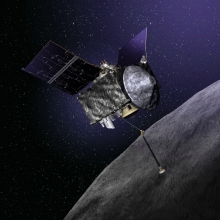NASA’s OSIRIS-REx program has successfully completed a comprehensive technical review of the mission and has been given approval to begin building the spacecraft, flight instruments and ground system. Lockheed Martin [NYSE: LMT] is responsible for development of the spacecraft, which will be the first U.S. mission sent to a near-Earth asteroid to collect and return samples.
 Launching in 2016, OSIRIS-REx will be NASA’s first asteroid sample return mission.
Launching in 2016, OSIRIS-REx will be NASA’s first asteroid sample return mission.
This major milestone was achieved after a successful mission critical design review (CDR) for the Origins, Spectral Interpretation, Resource Identification, Security-Regolith Explorer (OSIRIS-REx) mission. The review was performed by an independent review board, comprised of experts from NASA and several external organizations, that validated the detailed design of the spacecraft, instruments and ground system.
“Passing CDR is a significant milestone in our program,” said Rich Kuhns, program manager at Lockheed Martin Space Systems. “We have now completed the spacecraft design and are transitioning into fabrication as we prepare for the assembly, test and launch operations phase of the mission.”
OSIRIS-REx is scheduled to launch in the fall of 2016, rendezvous with the asteroid Bennu in 2018 and spend a year of reconnaissance at the asteroid, before collecting a sample of at least 2 ounces (60 grams) and returning it to Earth for scientists to study in 2023.
“The OSIRIS-REx team has consistently demonstrated its ability to present a comprehensive mission design that meets all requirements within the resources provided by NASA,” said principal investigator Dante Lauretta, from the University of Arizona's Lunar and Planetary Laboratory. “Mission CDR was no exception. This is a great team. I know we will build a flight and ground system that is up to the challenges of this ambitious mission.”
NASA's Goddard Space Flight Center will provide overall mission management, systems engineering, and safety and mission assurance for OSIRIS-REx. The University of Arizona leads the effort and provides the camera system and science processing and operations center. Lockheed Martin Space Systems in Denver will build the spacecraft, the sampling and Earth-return system, and perform spacecraft mission operations. OSIRIS-REx is the third mission in NASA’s New Frontiers Program, which is managed by the Marshall Spaceflight Center.
Headquartered in Bethesda, Md., Lockheed Martin is a global security and aerospace company that employs approximately 115,000 people worldwide and is principally engaged in the research, design, development, manufacture, integration and sustainment of advanced technology systems, products and services. The Corporation’s net sales for 2013 were $45.4 billion.